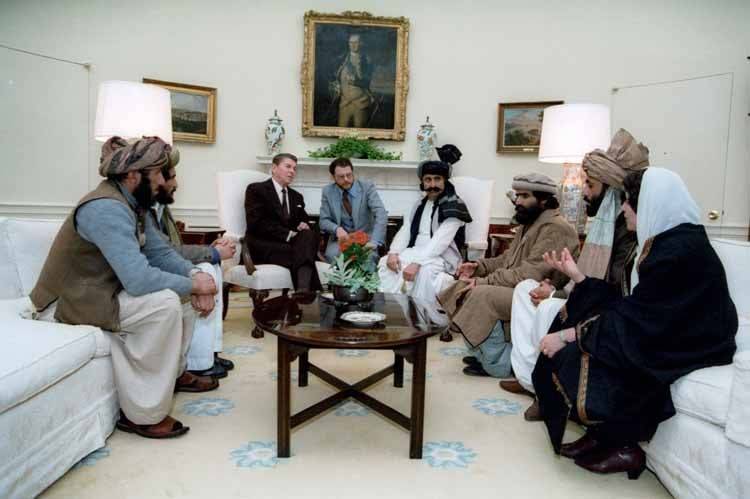After Ronald Reagan was elected in 1981, U.S. funding of the mujahideen increased significantly
The Reagan Doctrine was a strategy orchestrated and implemented by the United States under the Reagan Administration to oppose the global influence of the Soviet Union during the final years of the Cold War. While the doctrine lasted less than a decade, it was the centerpiece of United States foreign policy from the early 1980s until the end of the Cold War in 1991.
Under the Reagan Doctrine, the United States provided overt and covert aid to anti-communist guerrillas and resistance movements in an effort to "roll back" Soviet-backed communist governments in Africa, Asia, and Latin America. The doctrine was designed to diminish Soviet influence in these regions as part of the administration's overall Cold War strategy.
With the arrival of the Reagan administration, the Heritage Foundation and other conservative foreign policy think tanks saw a political opportunity to significantly expand Carter's Afghanistan policy into a more global "doctrine", including U.S. support to anti-communist resistance movements in Soviet-allied nations in Africa, Asia, and Latin America.
Reagan Doctrine - Wikipedia, the free encyclopedia
Yup. Damned well worked a lot better than Detente. He wisely continued Carter's policy in Afghanistan along with a full-court press which helped unravel the USSR and the old Brezhnev hacks.
You are not as stupid as I thought, but that's not much of a standard.
Five Friends Food 'Fresh Bars' What We Know about Climate Change Inside Climate News Go Fossil Free RealClearScience Newton Blog
Monday, March 21, 2011
The Whitewashing of Ronald Reagan
By Tom Maertens
(A version of this originally appeared in the Mankato, MN Free Press.)
A Gallup poll taken in 1992 found that Ronald Reagan was the most unpopular living president apart from Nixon, and ranked even below Jimmy Carter; just 46 percent of Americans had a favorable view of Reagan while Carter was viewed favorably by 63 percent of Americans.
This was before the Hollywood-style re-write of Reagans presidency that created the fictional character portrayed during Reagans 100th birthday celebration. The campaign was led by Grover Norquist and his Ronald Reagan Legacy Project, along with corporate-funded propaganda mills like Heritage and American Enterprise Institute that underwrote hundreds of flattering books to create a mythic hero and perpetual tax-cutter. They singled out Reagans 1981 tax cut that lowered top marginal rates from 70% to 28% as the basis for the campaign, leaving out the inconvenient reality that he subsequently raised taxes eleven times, according to former Republican Senator Alan Simpson who was there.
The plutocrats idolize Reagan because he cut taxes on the wealthy -- on income, capital gains, interest, and dividends -- and increased taxes on working people, including raising the self-employment (SECA) tax rate by 60%. He made major cuts in Medicaid, food stamps, aid to families with dependent children (AFDC), and school lunch programs. Mark Hertsgaard (On Bended Knee: the Press and the Reagan Presidency) called it arguably the single greatest government-led transfer of wealth in history, and in the direction of the top two percent; the number of families living below the poverty line increased by one-third under Reagan. The result is an enduring, entitled class of individuals who believe that work should be taxed, but wealth should not, and probably, like Reagan that The homeless are homeless because they want to be homeless. They control the Republican Party.
Their revisionist history makes Reagan into a small-government fiscal conservative, but he actually grew the government by 53% (Mises Institute), increasing military expenditures by 27% and creating another new department, Veterans Affairs. He never submitted a balanced budget and ended up tripling the national debt to $3 trillion. His S&L bailout cost 2.4 times more to fix (relative to GDP) than Bushs financial crisis. The Washington Post reported in Reagan's last year that "In less than a decade, the world's largest creditor nation has become its leading debtor
.
Did Reagan end the Cold War? Immediately after the Berlin Wall fell, a USA Today survey found that only 14% of respondents believed that. Historians mostly credit forty years of Containment by eight U.S. presidents. As Tony Judts Postwar concluded:
Washington did not bring down Communism Communism imploded of its own accord.
Vox Verax: The Whitewashing of Ronald Reagan
 he was alive at the time,in a baby carriage.
he was alive at the time,in a baby carriage.
 two birds of a feather reagan and Obama.No wonder Obama liked reagan so much,he reminded him so much of himself,someone who betrayed the middle class,sent jobs overseas,got us into the worst debt ever,was a mass murderer,and shit on the black people.definetely two birds of a feather.
two birds of a feather reagan and Obama.No wonder Obama liked reagan so much,he reminded him so much of himself,someone who betrayed the middle class,sent jobs overseas,got us into the worst debt ever,was a mass murderer,and shit on the black people.definetely two birds of a feather.








